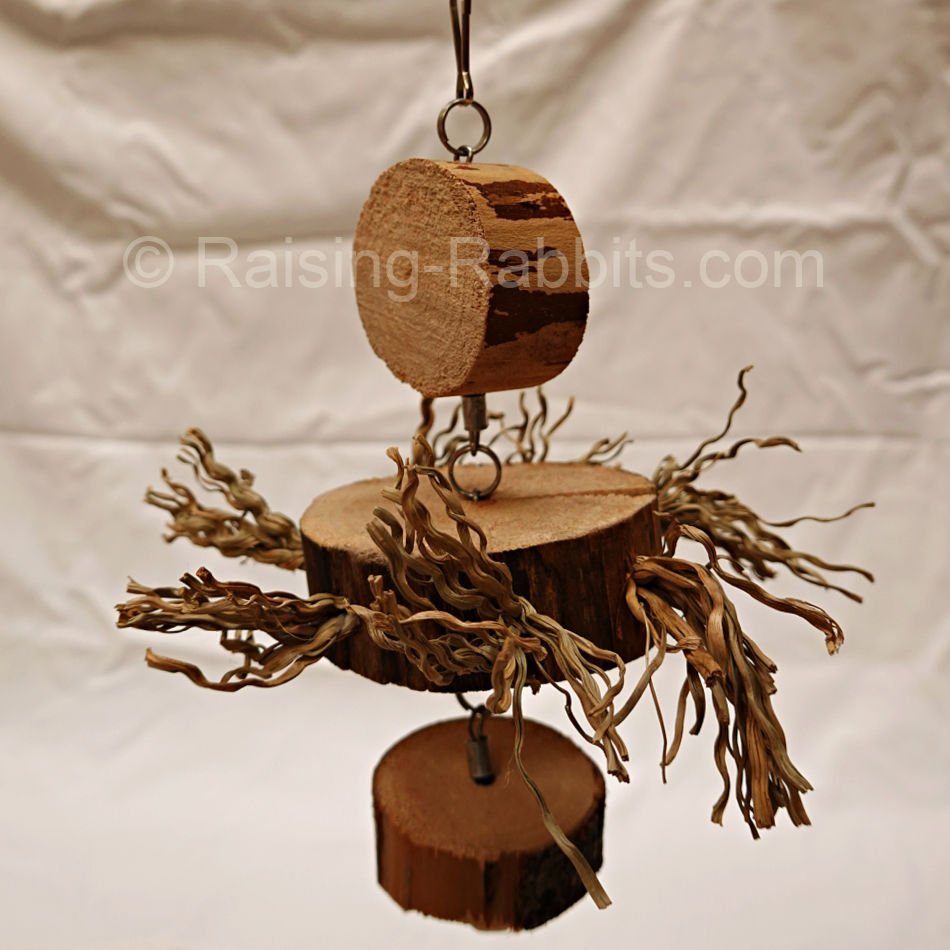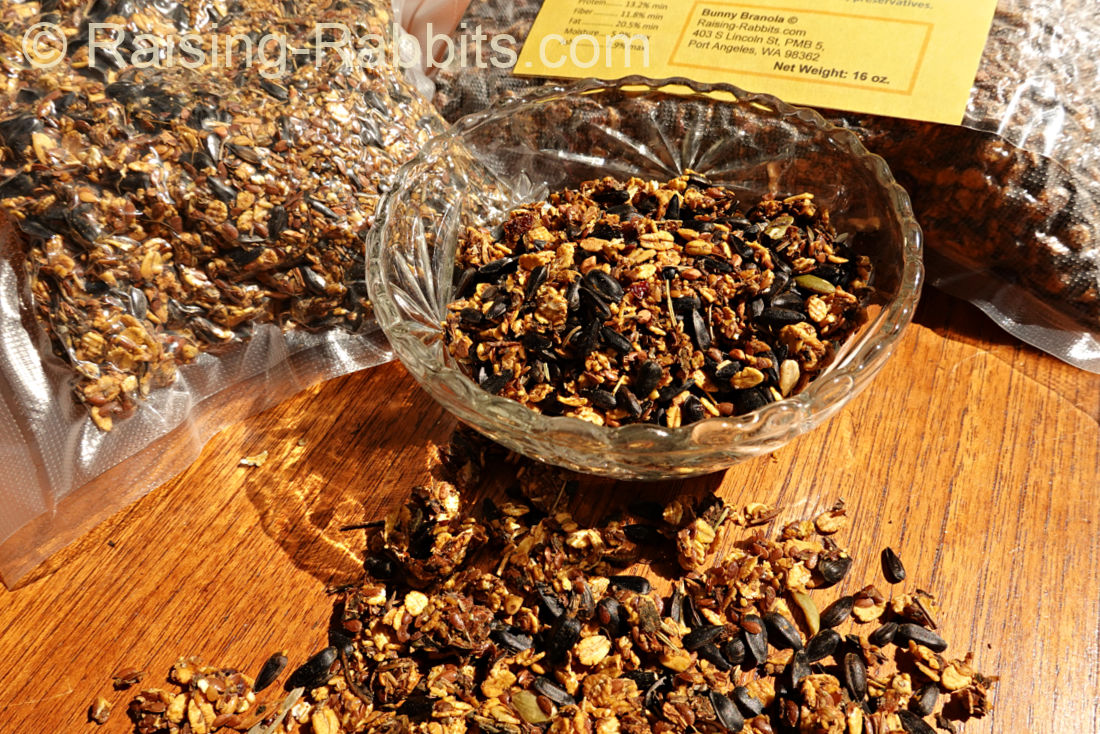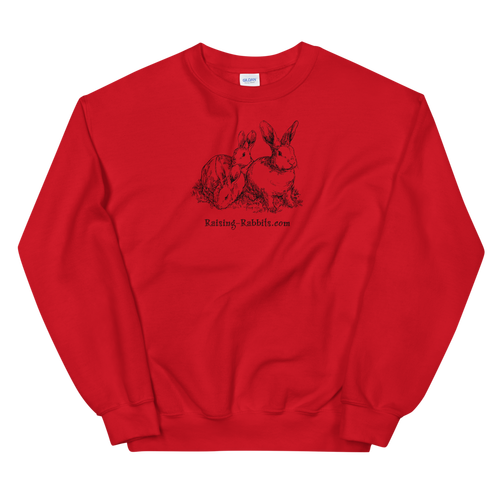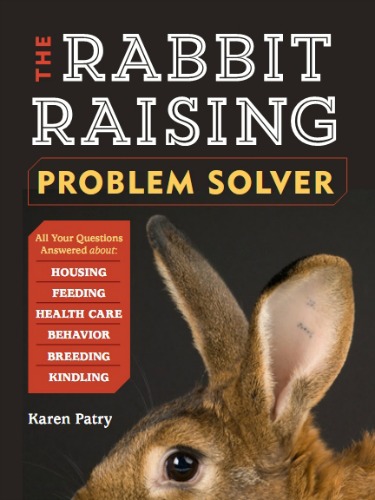Rabbit Illnesses
Due to Parasites
Rabbit illnesses caused by parasites can make your rabbit's
life miserable, even threaten its survival.
Here are a few of the more common parasitic illnesses you might encounter, and hopefully some useful tips on how to help your rabbit.
Ear Mites
Ear mites are also sometimes called ear canker. An external parasite (mite) chews on and irritates the inside of the rabbit's ear, which begins to ooze. The rabbit scratches in his ear, and then an infection can start up. If the condition is not treated, it can drain the rabbit's health. A typical case of ear mites is confined to the inside of the ear, however a particularly severe infestation can engulf the entire ear and begin to infest parts of the rabbit's head and brain.
Ear mites are one of those easy-to-treat rabbit illnesses.
To treat, drop a few drops of mineral or olive oil into the affected ear, and massage the base of the ear to ensure an even coating of oil within the ear. Coat all areas of the infestation. The oil suffocates the mite. The mite eggs live for three weeks, so you'll need to repeat this treatment as follows:
- Every day for 3 days. Initially, you'll need to carefully soak the crusts using a Q-tip, or removing the crusts if you can do so without forcing or causing more trauma. Disinfect the rabbit's cage to prevent a re-infestation.
- 3 more treatments, once every other day
- Lastly, 3 treatments - once a week.
This should solve your ear mite problem. If, however, you find the infestation has spread to a number of animals, you can follow up the treatment with a routine monthly application of oil in the ear.
An antibiotic cream may help with any underlying infection.
Ivermectin will wipe out the infestation in a single
subcutaneous injection. Obtain through your vet, or purchase 1% cattle Ivermectin at the feed store, pet shop, or below.
Ivermectin Drench
Drop Ivermectin Drench onto the nape of the neck at a rate of 0.05cc per pound. (For an 8 pound rabbit, that would be 0.35cc.) Protection lasts up to 28 days.
Fur Mites in Rabbits
This parasite likes to chew on the fur and skin of the rabbit's body. The most common spot to find them is in the triangle behind the rabbit's ears.
You'll see hair loss, and probably scratches on irritated skin behind the ears and into the rabbit's coat.
A dusting of kitten flea powder will help rid your rabbit of mites. Don't forget to repeat the dusting in 10 days to kill any newly hatched mite eggs.
Learn much more at Fur
Mites in Rabbits.
Nosema (or EC)
Nosema is caused by a protozoan (one-celled) organism, Encephalitozoon cuniculi, hence the name EC which is much easier to spell, that can infect several species. Infections are rare in humans.
Other species seem able to clear the organism from the body completely, however in the rabbit, EC infections persist throughout their lives.
Nosema spores are spread in the rabbit’s urine, but the protozoan lives throughout the rabbit’s organs, including the kidneys, liver, lung, spinal cord and brain. The rabbit is infectious 30 days after the initial infection until 90 days, after which it no longer sheds spores.
The good news is: most
rabbits remain symptom-free for all their lives.
The bad news is: there is almost nothing you can do to fix this rabbit illness, should your rabbit begin showing symptoms, except to try to make your rabbit comfortable or euthanize the animal.
EC is very common in pet rabbit populations, up to 80% in some areas. Most pet rabbits probably contract this rabbit illness from their mothers.
Symptoms of EC rabbit illness related to the kidneys, brain and
spinal cord:
- Generalized weakness (kidney-related)
- Poor appetite
- Increased water intake
- Increased urination
- Ammonia odor in the breath
- Sudden death
Brain symptoms (dependent on the area of the brain and spinal cord that is affected):
- Facial paralysis
- Weakness in just one leg
- Hind quarter paralysis
- Head tilt
- No appetite
- Behavior changes
- Depression
- Seizures (mild to severe)
- Sudden death
There are no treatments or cures for nosema. Multiple drugs of many varieties have been tried in the case of active infection. Anecdotal reports of successful treatment by Albendazole and Neosporin have been heard. (Panacur contains Fenbendazole which is similar to Albendazole.)
Quarantine: Young infected pet rabbits may still be shedding spores at 4 months old. It is suggested that you isolate rabbits that are younger than 5 months old from your other pet rabbits, to allow the infectious stage to pass.
Disinfect everything that may have been contaminated with rabbit urine, using Lysol or a strong bleach solution.
According to Rabbit Production, meat from infected rabbits
is safe to eat.
Rabbit Production, 10th Edition
This Important Scientific Resource is Available in Paperback, Hardcover, and Kindle. Prior Editions are Equally Useful if Newer Editions are Scarce.
Pinworms
Pinworms are a common parasite in rabbits. A sure sign of pinworms are tiny white flecks in the rabbit's droppings.
Pinworms are usually just a nuisance. However, pinworms can become a problem if your rabbit is already sick. They can strip your show rabbits of their conditioning and cost you the win. They can rob a pregnant or lactating doe of nutrients, putting the doe and her kits at risk for other diseases.
Suspect pinworms when you see a rough coat, poor flesh condition, bony over the back, and yet pot-bellied. Your vet can make the diagnosis for you, if needed.
If you see the telltale white flecks, treat with piperazine, 1 mg per ml of water, for 2 days. Remove all sources of un-medicated water during treatment. Re-treat in 10 days. If this doesn’t improve your rabbit’s symptoms, you should consult a rabbit-savvy vet for more troubleshooting.
Racoon Roundworm
Rabbits can be intermediate hosts for the raccoon roundworm. They can be exposed to infective roundworm eggs through direct exposure to raccoon latrines, or indirectly through contaminated yard clippings or other fresh or dried forages. Learn more about the Raccoon Roundworm and rabbits as intermediate hosts here.
Baylisascaris procyonis is the scientific name for the Raccoon Roundworm. This roundworm represents a dangerous threat to humans, and especially to toddlers who are prone to put all sorts of stuff in their mouths indiscriminately. Learn how to protect yourself and your children here.
Ringworm
Ringworm is a fungal disease which is highly contagious to rabbits and humans. What you'll see: Hair loss in ringed pattern, along with shallow crusted sores.
- Use gloves to handle the rabbit
- Boil or discard the clothes you wear while handling the rabbit.
- Disinfect the affected animal's cage with a strong bleach solution.
- Consult your rabbit-savvy vet ASAP for methods of treatment.
Where can I find top quality rabbit cages that are great for rabbit feet?
From Raising-Rabbits, of course!
Raising-Rabbits has partnered with Hostile Hare to bring you cages that exceed our rigorous rabbit housing standards.
We do not manufacture cages, but we sure recognize a well-built, predator-proof, baby-safe, bunny-feet-safe cage when we see it! We think Hostile Hare cages will serve you well for years.
Explore the choices by clicking the logo or this link!
Tapeworms and Tapeworm Life Cycle
Rabbits are an intermediate host for the dog tapeworm (Taenia pisiformis). Infection comes from contamination of their living space by dog/coyote feces, or from hay contaminated by feces.
Get
the full scoop on tapeworms and the tapeworm life cycle here.
Ivermectin Use for Rabbit Illnesses due to Parasitic Infestations
Ivermectin is typically the treatment of choice for many parasites.
If using an injectable 1% solution, dose at the rate of 0.02 to 0.025 milliliters (ml or cc) per pound. Page 261 in Rabbit Raising Problem Solver offers a weight chart and dosage amounts. Administer as a subcutaneous injection.
An Ivermectin Drench is also an effective treatment: apply at a rate of 0.05cc per pound of animal. So:
- Treat a four-pound pet rabbit by dropping 0.20cc on the nape of its neck.
- Treat an eight-pound rabbit by dropping 0.36cc on its nape.
- Treat a twelve-pound meat rabbit by dropping 0.54cc on its nape.
Amounts can be rounded upward or downward slightly, so you don't worry that you're over- or under-dosing your rabbit. Treatment by either injection or externally should result in up to 28 days of protection, which is more than long enough to control ear mites or fur mites with a single application.
Ivermectin is generally considered to be quite safe, including for pregnant does according to MediRabbit.
However, there are dangers with Ivermectin use, especially if used (or overused) regularly. It is possible that the prophylactic use of Ivermectin on a regular basis may result in reproductive tract damage, up to and including sterility, especially in bucks. Does may sustain high levels of inflammation, bleeding in the uterus, destruction of eggs, and failure to conceive. Prognosis for recovery is tied to the severity of damage.
If you've been administering a lot of ivermectin consistently for over a month, and your does begin to fail to conceive or kindle litters, include ivermectin usage in your review of possible culprits.
For more detail, see this 2017 study regarding ivermectin use.
Go from Parasitic Rabbit Illnesses to Rabbit Health
As we are not veterinarians, we direct you to our Disclaimers at the bottom of the Rabbit Diseases page.
Hopefully this information will help you treat and eradicate any rabbit illnesses caused by parasites.
Merck Veterinary Manual on Rabbits
Double-Value Guarantee
Our policy is to always OVER-deliver
on value,
which is why your purchase is fully covered by our
Double-Value
Guarantee.
Go ahead - take any of our e-books for a test drive. Peruse our detailed informational and educational e-books. Examine our plans for building rabbit cages, runs, or metal or PVC hutch frames. Check out the Rabbit Husbandry info e-books.
If you aren't completely satisfied that your e-book purchase is worth at least double, triple or even quadruple the price you paid, just drop us a note within 45 days, and we'll refund you the entire cost. That's our Double-Value Guarantee.
Note: When you purchase your
e-books, they will be in PDF format, so you can download them to any device that
supports PDF format. We advise making a back-up copy to a drive or cloud
account. If the books are lost, you can also purchase another copy from Raising-Rabbits.















